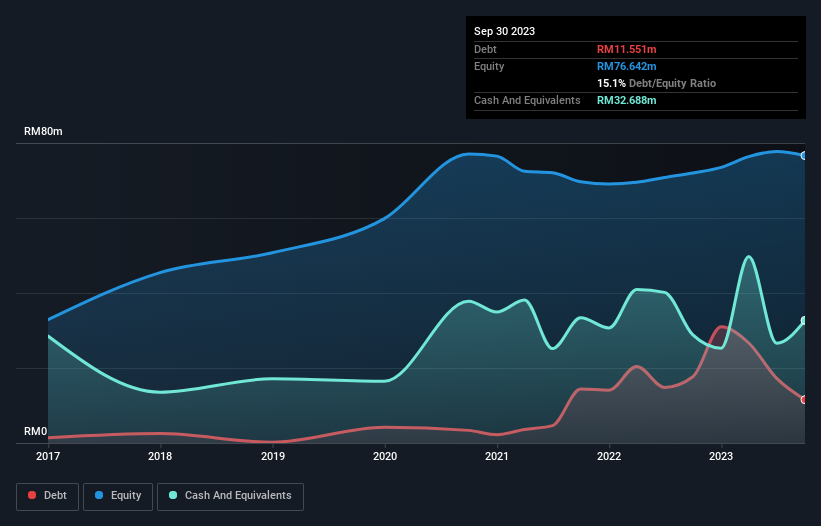- Malaysia
- /
- Electrical
- /
- KLSE:PWRWELL
Powerwell Holdings Berhad (KLSE:PWRWELL) Seems To Use Debt Rather Sparingly
Legendary fund manager Li Lu (who Charlie Munger backed) once said, 'The biggest investment risk is not the volatility of prices, but whether you will suffer a permanent loss of capital.' It's only natural to consider a company's balance sheet when you examine how risky it is, since debt is often involved when a business collapses. We note that Powerwell Holdings Berhad (KLSE:PWRWELL) does have debt on its balance sheet. But the real question is whether this debt is making the company risky.
When Is Debt Dangerous?
Generally speaking, debt only becomes a real problem when a company can't easily pay it off, either by raising capital or with its own cash flow. In the worst case scenario, a company can go bankrupt if it cannot pay its creditors. However, a more frequent (but still costly) occurrence is where a company must issue shares at bargain-basement prices, permanently diluting shareholders, just to shore up its balance sheet. Of course, plenty of companies use debt to fund growth, without any negative consequences. When we think about a company's use of debt, we first look at cash and debt together.
See our latest analysis for Powerwell Holdings Berhad
What Is Powerwell Holdings Berhad's Debt?
You can click the graphic below for the historical numbers, but it shows that Powerwell Holdings Berhad had RM11.6m of debt in September 2023, down from RM17.7m, one year before. But on the other hand it also has RM32.7m in cash, leading to a RM21.1m net cash position.

How Healthy Is Powerwell Holdings Berhad's Balance Sheet?
The latest balance sheet data shows that Powerwell Holdings Berhad had liabilities of RM69.3m due within a year, and liabilities of RM8.21m falling due after that. Offsetting this, it had RM32.7m in cash and RM49.9m in receivables that were due within 12 months. So it actually has RM5.08m more liquid assets than total liabilities.
This short term liquidity is a sign that Powerwell Holdings Berhad could probably pay off its debt with ease, as its balance sheet is far from stretched. Simply put, the fact that Powerwell Holdings Berhad has more cash than debt is arguably a good indication that it can manage its debt safely.
Even more impressive was the fact that Powerwell Holdings Berhad grew its EBIT by 115% over twelve months. That boost will make it even easier to pay down debt going forward. The balance sheet is clearly the area to focus on when you are analysing debt. But it is Powerwell Holdings Berhad's earnings that will influence how the balance sheet holds up in the future. So if you're keen to discover more about its earnings, it might be worth checking out this graph of its long term earnings trend.
Finally, while the tax-man may adore accounting profits, lenders only accept cold hard cash. Powerwell Holdings Berhad may have net cash on the balance sheet, but it is still interesting to look at how well the business converts its earnings before interest and tax (EBIT) to free cash flow, because that will influence both its need for, and its capacity to manage debt. Over the last two years, Powerwell Holdings Berhad actually produced more free cash flow than EBIT. There's nothing better than incoming cash when it comes to staying in your lenders' good graces.
Summing Up
While it is always sensible to investigate a company's debt, in this case Powerwell Holdings Berhad has RM21.1m in net cash and a decent-looking balance sheet. And it impressed us with free cash flow of RM16m, being 131% of its EBIT. So we don't think Powerwell Holdings Berhad's use of debt is risky. There's no doubt that we learn most about debt from the balance sheet. But ultimately, every company can contain risks that exist outside of the balance sheet. Be aware that Powerwell Holdings Berhad is showing 2 warning signs in our investment analysis , you should know about...
At the end of the day, it's often better to focus on companies that are free from net debt. You can access our special list of such companies (all with a track record of profit growth). It's free.
New: Manage All Your Stock Portfolios in One Place
We've created the ultimate portfolio companion for stock investors, and it's free.
• Connect an unlimited number of Portfolios and see your total in one currency
• Be alerted to new Warning Signs or Risks via email or mobile
• Track the Fair Value of your stocks
Have feedback on this article? Concerned about the content? Get in touch with us directly. Alternatively, email editorial-team (at) simplywallst.com.
This article by Simply Wall St is general in nature. We provide commentary based on historical data and analyst forecasts only using an unbiased methodology and our articles are not intended to be financial advice. It does not constitute a recommendation to buy or sell any stock, and does not take account of your objectives, or your financial situation. We aim to bring you long-term focused analysis driven by fundamental data. Note that our analysis may not factor in the latest price-sensitive company announcements or qualitative material. Simply Wall St has no position in any stocks mentioned.
About KLSE:PWRWELL
Powerwell Holdings Berhad
An investment holding company, engages in the design, manufacture, and trading of electricity distribution products in Malaysia and Indonesia.
Excellent balance sheet with proven track record.
Similar Companies
Market Insights
Community Narratives



